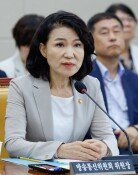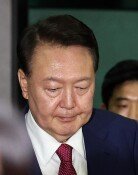[Speech] Korea and the United States: The "Real" Relationship
[Speech] Korea and the United States: The "Real" Relationship
Posted February. 09, 2001 19:33,
![[Speech] Korea and the United States: The \"Real\" Relationship](https://dimg.donga.com/egc/CDB/ENGLISH/Article/20/01/02/09/2001020977430.gif)
As I prepare to leave my post as U.S. Ambassador to Korea, I find myself reviewing/remembering the past three years as well as looking to the future. I would like to share these reflections on the past with you as well as my expectations for the future.
I arrived in Seoul as Ambassador in late 1997 just a few weeks before the Korean Presidential election. In a peaceful transfer of power from President Kim Young Sam to President-elect Kim Dae Jung - the first opposition party candidate to be elected President - Korea demonstrated again its maturity as a democracy. During my first months as Ambassador, I watched as Korea, led by President Kim and assisted by the United States and other members of the international community, struggled to overcome the financial crisis and began to implement difficult economic reforms agreed upon in the IMF program. And over the last year, I have witnessed the encouraging signs of success for President Kim`s engagement policy toward the DPRK. The June 2000 Summit in Pyongyang, an on-going process of South-North negotiations, family reunions, and now signs of possible change in the North have marked the beginning of a remarkable transformation of South-North relations. Clearly, my wife and I have been privileged to represent the United States in Korea at a time of dramatic - even historic - change.
I have seen Korea, its leaders and its people, face wrenching problems, reach difficult economic, political, and diplomatic decisions, and come through them stronger. The Koreans with whom I have dealt are strong, resourceful, modern, successful, and proudly independent. This is the Korea with which America enjoys its real relationship.
Before coming to Korea as Ambassador, I had heard and read about a bilateral relationship that seemed to assume a dependent, victimized Korea locked in a troubled inequitable relationship with a dominant U.S. In truth, I have had glimpses of that inaccurate view of our relationship during my own time here, most often in media analysis of our dealings with one another. This view often focused on a series of individual issues: the SOFA negotiations, the investigation of the tragedy at Nogun-ri, and the rare environmental mishap on American military bases. Occasionally, these events have been treated as if they were indicators that our relationship was unfair and plagued with problems, indeed, as if these issues represented the sum of our relationship. I do not agree. And today, I would like to talk about what I consider to be our real relationship.
We need to look at things for what they are, to place issues into the context of a relationship. Our investigation of the tragic events at Nogun-ri, for example, provided an undeniable reminder of the horrors of war. Though only time can ultimately ease the pain, we have sought to help the process of healing through frankness, contrition and reconciliation, seeking to determine, as best we can after half a century, what really happened. The SOFA negotiations strengthened the foundation for a continued, strong military relationship between us based on the simultaneous respect for Korea`s growing democratic traditions and the maintenance of the rights of our service members. The key point I want to make regarding these issues is that we dealt with them fairly and well, on a basis of mutual respect. It is not self-congratulatory to say this. Rather, it is merely to assert that our "real" relationship works.
Put another way, despite the occasional headline and demonstration, the actual business of dialogue and cooperation between our governments goes on smoothly. Ours is now a relationship in which the problems that come up - and problems are inevitable - are dealt with sensibly and solved cooperatively. Let me further define my image of the "real" relationship, for that is the paradigm within which we should be working as our alliance enters this new millennium.
I`ll do so by answering three questions. First, how has our real relationship developed and matured? Second, will our real relationship prove effective in meeting the challenges we will face - particularly in managing our evolving relations with the DPRK? And, finally, where will our relationship lead us in the future?
Though the United States and Korea first established diplomatic ties at the end of the 19th century, our modern relationship began only at the close of World War II, and the Korean War quickly transformed it into an alliance with a largely military focus. The relationship has never lost its military component. And until tensions with the DPRK have relaxed considerably, armed deterrence will continue to be an essential element in our shared vision of the future.
However, everything else in the relationship has changed dramatically. Koreans have lived through an extraordinary transformation. The entrepreneurial drive of a few business leaders and the unrelenting hard work of millions of Koreans transformed the country from poverty to the 11th largest economy in the world. Political development has been no less stunning. Again, progress was spearheaded by a few determined leaders, but rendered inevitable by the hopes, expectations, and demands of the Korean people. The last two presidents of the Republic of Korea were examples of this political transformation, and even spent time in jail for their democratic beliefs.
As a result of Korea`s economic and political transformations, the balance between the Republic of Korea and the DPRK was turned on its head. Militarily dominant at the outset of the Korean War and economically superior through much of the 1960s, the DPRK now needs massive international aid to feed its people. Its economy is broken and its government sacrifices the health and welfare of its people to maintain a swollen military. The Republic of Korea is now the confident leader on the peninsula, and its policy of engagement backed by deterrence has ushered in a new era in which reconciliation, not conflict, seems more likely to define the future.
Korea`s relationship with the United States has also been transformed. During the war, the U.S. was the essential ally. In the years that followed, the U.S. helped Korea begin its economic development process, opened its markets to Korean products, and prodded authoritarian leaders toward democracy. The balance among these elements in our relationship was constantly changing, but there was a steady trend toward Korean self-reliance as the military balance with the DPRK moved toward parity, the Korean economy strengthened, and as the drive for democracy reached fruition.
Almost unnoticed, the American view of Korea has also changed. We have seen Korea become much like most of America`s other traditional partners and allies. We have witnessed a growing convergence not just of our economic and security interests but also of our political values. Now, as democratic market economies, we approach the world in similar ways.
Our relationship is characterized by the knowledge that the things we share vastly outweigh the things that divide us. As democracies, we are reluctant to resort to force to solve problems. The availability of information about other countries, the freedom to travel and study in other countries, and the habit of resolving domestic conflicts through negotiation and compromise seem to be antidotes against the urge to use violence against other nations. As market economies, we see overwhelming advantages in trading with each other. Open trade stimulates the economies of both nations and adds greatly to the prosperity of our people.
Like all relationships between democracies, our relationship is also characterized by a convergence of interests. Our market economy democracies benefit from the prosperity brought by trade. We both need the stability that comes from the expectation that our disputes will be resolved peacefully, at the bargaining table. In our trade relationship, for example, we have learned to rely on the rules and norms of the WTO in solving our disputes. So we have a shared interest in strengthening global rules and norms in trade as well as in other fields including for example arms control and non-proliferation. Like all democratic market economies, we share an obligation to maintain the international system, to find ways to resolve differences peacefully, and to inform our citizens of the complexities and benefits of our external relationships.
As Korea has moved through the wrenching changes that were necessary to achieve full democracy, so is it working on the need to consolidate its economic gains. I`ve mentioned the transformation from poverty to world leader that is "The Miracle on the Han."
A similar transformation is now taking place within Korea. As a result of the traumatic crisis of 1997 and the program of reform and restructuring laid down in the agreement with the IMF, I believe that Korea has made an irreversible commitment to full participation in the globalizing international economy. Korea is now a far more open economy than three years ago. I believe there is a wide understanding in Korean society of the benefits of openness, as well as the price that will be paid if reform and restructuring do not continue. This strategy has already produced major benefits. In 1998 and 1999, Korea received more direct foreign investment than it had taken in during the previous 37 years. With this investment came jobs, technology, and connections. As Korea has accommodated this investment, it has quietly, but inevitably, become an increasingly integrated member, and beneficiary of, the international community.
I have been talking about demonstrable aspects of Korea`s new relationship with the world and with the U.S. One thing that does not characterize this kind of relationship is an absence of disagreement. As our relationship has grown more complex, it is not surprising that we have experienced friction and disagreement. But we can now be confident that we can solve problems through discussion. The U.S. has its full share of disputes with its traditional allies. But no one ever doubts that negotiations and the normal give and take of diplomacy will resolve differences. We look at such international disputes the way we look at a strike by organized labor: it is a problem, but there is a tested mechanism for solving it. And we assume - we know - that the mechanism will work.
Let us look, for example, at our successful negotiation to revise the Status of Forces Agreement. As we entered the final stage of the negotiations this fall, several things were apparent. First, both Korea and the United States recognized their fundamental shared interest in maintaining U.S. forces on the peninsula. Second, the situation here had changed enough that the need for a revised agreement was obvious. And, of course, both countries wanted to reach an agreement that would enhance bilateral security.
On that basis we negotiated. On that basis, we reached agreement. In the end, both countries were able to achieve their individual and shared goals. The reality is that, in the end, we both got a good deal. American forces will continue to contribute to deterrence. The U.S. underscored its respect for Korea`s environment, while Korea undertook to ensure our forces` operational needs. The transformation of the Korean legal system has been acknowledged; the legal rights of our service people have been assured. Korea`s other requests have also been accommodated. In sum, our two countries successfully negotiated a mutually beneficial agreement.
Let me now move on to my second question and ask whether this relationship of cooperation, mutual respect, and compromise will prove effective in dealing with perhaps the most important challenge we face - the DPRK. The challenge of managing progress with the DPRK is formidable. But it is one for which our "real" relationship is clearly fit. In fact, the progress we have already made, thanks to President Kim Dae Jung`s engagement policy and the Perry Process, is a perfect example of how quiet consultation and coordination should work between cooperating partners. Our governments have pursued the policy of engagement with the DPRK in parallel. We have consulted with unprecedented closeness, and have each played the role of direct interlocutor with Pyongyang. Progress in one of our bilateral dialogues has benefited the other. There has never been any doubt in Washington or Seoul - or in Pyongyang - that we were pursuing a common strategy and working in close coordination.
I am confident that this close coordination will continue. Our continued commitment to a strong deterrent capability combined with our common engagement strategy enables us to deal with North Korea from a position of confidence and strength. I believe the outlook is good. We can afford to be patient. We will be able to sustain and manage the long, trying process of bringing the DPRK into the community of nations and eliminating the threat posed by its weapons of mass destruction because of who we are; because of our "real" relationship.
I want to conclude by addressing my last question: "Where will the future take us?" Frankly, it is hard to say where we will be 25 or 50 years from now. But I think I know how we will get there. The basis of our countries` political and economic systems is compromise, exchange, sharing, and mutual respect. Our systems build in the assumption that we will share benefits. They strive to reach win-win solutions. They readily adapt to surmount difficulties and survive setbacks.
Our "real" relationship will not be free of real problems. But it is built to solve problems. It assumes that most of our interests are mutual, and it is based on a solid foundation of shared values and equality. Of course, as we move through the years, we will squabble, and we will disagree. But, without fail, we will trade, we will consult, we will coordinate, and we will grow even closer in the values and principles we share. And we will meet the challenges of the future. Our interests will never be identical. But I have no doubt we will approach the future as equal members of the same team. That is the "real" relationship we enjoy today as I leave this wonderful country and prepare to become a former American Ambassador to Korea. It is the product of over a century of work and interaction between us. It is the fruit of our shared sacrifices and our shared values. I encourage you to nurture it well.




![[이진영 칼럼]꿈쩍도 않는 국힘 ‘쩍벌남’들](https://dimg.donga.com/c/138/175/90/1/wps/NEWS/IMAGE/2025/07/08/131964977.1.jpg)
![“동대표 갑질 못 참겠다”…관리사무소 전원 사직한 아파트 [e글e글]](https://dimg.donga.com/c/138/175/90/1/wps/NEWS/IMAGE/2025/07/08/131958287.2.jpg)

